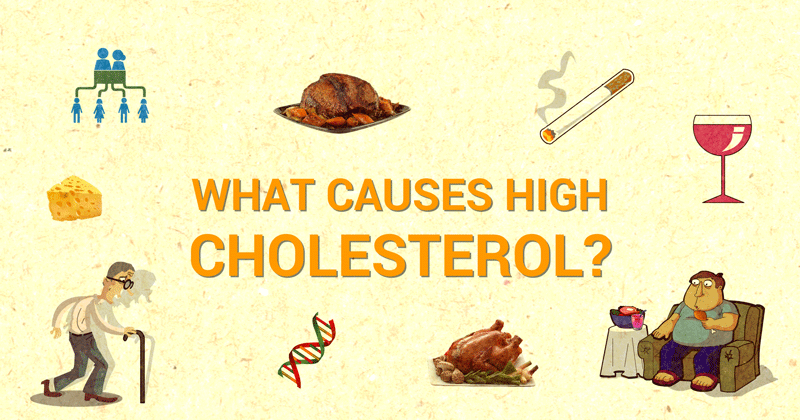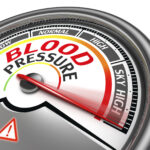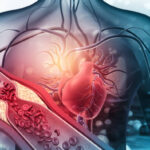What are the causes of high cholesterol?
When a topic regarding the causes of high cholesterol arise, understand that high cholesterol isn’t just a standalone health concern. It acts more like a pebble tossed into a pond, creating ripples that can affect your overall health in several ways.
Increased Risk of Cardiovascular Disease: This is the most well-known consequence. High cholesterol contributes to the buildup of plaque in your arteries (atherosclerosis). This plaque narrows the arteries, restricting blood flow and increasing the risk of:
- Coronary artery disease (CAD): Reduced blood flow to the heart muscle, which can lead to chest pain (angina) and heart attack.
- Stroke: When a blood clot blocks a blood vessel in the brain, depriving brain tissue of oxygen and nutrients.
Secondary Role in Other Diseases: While high cholesterol can be a primary culprit, it can also be a consequence of other health conditions:
- Inflammatory Diseases: Conditions like lupus, which cause chronic inflammation throughout the body, can lead to abnormal cholesterol levels.
- High Blood Pressure (Hypertension): Often, high cholesterol and high blood pressure go hand-in-hand. They both contribute to hardening and narrowing of arteries, creating a double threat to your cardiovascular health.
The Importance of a Holistic Approach: Because of these connections, managing high cholesterol is just one piece of the puzzle. A comprehensive approach to your health is crucial. This might include:
- Addressing underlying health conditions that contribute to high cholesterol.
- Implementing lifestyle changes like a healthy diet and regular exercise.
- Exploring medication options with your doctor, if necessary.
By taking a proactive approach, you can manage your cholesterol and reduce your risk of developing these related health problems. Remember, early detection and intervention are key!
What is Cholesterol?
High Cholesterol: The Noisy Sneak Attack on Your Body
Imagine your blood is like a river carrying important things throughout your body. One of those things is a kind of fat called a lipid. Your body needs some fat, but not too much. If there’s too much fat in the river, it’s like a traffic jam! This is high cholesterol.
Here’s the tricky part: this traffic jam builds up slowly over time, without any warning signs. It’s like a silent sneak attack on your insides! The fat gets stuck in your arteries, which are like the highways for your blood. This sticky stuff is called plaque.
Regarding causes of high cholesterol, there are two types of fat in your blood:
There are different kinds of fats in your body. You might have heard about “good cholesterol” and “bad cholesterol.”
Good cholesterol is like a helper. It’s called high-density lipoprotein (HDL). It takes cholesterol to your liver, which helps keep your cholesterol levels balanced.
Your liver only keeps what your body needs and gets rid of the rest. It’s important to have enough HDLs to take cholesterol to your liver. If you don’t have enough HDLs, there could be too much cholesterol in your blood.
Bad cholesterol is called low-density lipoprotein (LDL). It’s the troublemaker that builds up plaque in your arteries. Having too much LDL can cause heart disease over time.
If the plaque gets too big, it can cause big problems:
- Blocked Roads: The narrowed highways make it harder for blood to get where it needs to go. This can lead to chest pain (angina) or even a heart attack.
- Wrong Turns: Sometimes, a piece of plaque can break off and travel through your blood, blocking an artery in your brain. This can cause a stroke.
The good news is you can fight back against high cholesterol! Here’s how:
- See a doctor: They can do a simple blood test to check your cholesterol levels.
- Eat healthy: Choose foods that are low in bad fat and high in good fat.
- Exercise: Get your body moving to help keep your blood flowing smoothly.
By taking care of yourself, you can keep your blood flowing freely and avoid the problems relating to the causes of high cholesterol.
When to Check Your Cholesterol: A Simple Guide
Just like your car needs regular oil changes, your body needs regular checkups for cholesterol. Here’s a basic idea of when to get yours checked:
- Kids and Teens: Starting at age 9, aim for a check every 5 years. If your family has a history of high cholesterol or heart problems, your child might need an earlier check.
- Adults:
- Men: Every 5 years until age 45. Then, switch to yearly checks after 65 and every 1-2 years between 45 and 65.
- Women: Every 5 years until age 55. Then, switch to yearly checks after 65 and every 1-2 years between 55 and 65.
Remember, this is a general guideline. Your doctor will consider your individual health and risk factors to decide what’s best for you. For example, if you have high cholesterol already or other heart disease risks, you might need more frequent checks.
On the issue of causes of high cholesterol, the most important thing is to talk to your doctor and create a plan for monitoring your cholesterol levels. This will help you stay on top of your heart health!
Causes of High Cholesterol
Causes of High Cholesterol: Why Does it Happen? It’s Not All Your Fault!
High cholesterol can be a pain, but guess what? It’s not always entirely under your control. There are two main culprits: your lifestyle and your genes (thanks, mom and dad!).
Lifestyle choices can definitely play a role:
- Smoking Bummer: Smoking is a double whammy for your cholesterol. It lowers the good stuff (HDL) that helps clear things out and raises the bad stuff (LDL) that gums up the works.
- Stress Monster: Feeling overwhelmed? Stress can mess with your hormones, tricking your body into making more cholesterol.
- Alcohol in Overdrive: Too much booze can raise your total cholesterol, not a good look!
- Couch Potato Power Down: Exercise is like magic for your cholesterol. Regular activity, especially things that get your heart pumping (aerobics), helps boost your good cholesterol levels. Sitting all day doesn’t give your body a chance to make enough good stuff.
- Food Fight: Some foods are like cholesterol cheerleaders, raising your levels. Others are champions for good cholesterol. Your doctor or a nutritionist can help you figure out the best foods to fight for your heart health.
Now that you’ve known some causes of high cholesterol, remember, even though some of these things can affect your cholesterol, it doesn’t mean you’re doomed! There are ways to manage it, and your doctor can help you create a plan to keep your heart happy and healthy.
Symptoms of High Cholesterol
Most of the time, high cholesterol doesn’t show any signs or symptoms. Even if you’re really fit and active, you might still have high cholesterol without knowing it. You usually won’t feel anything until high cholesterol starts causing other issues in your body.
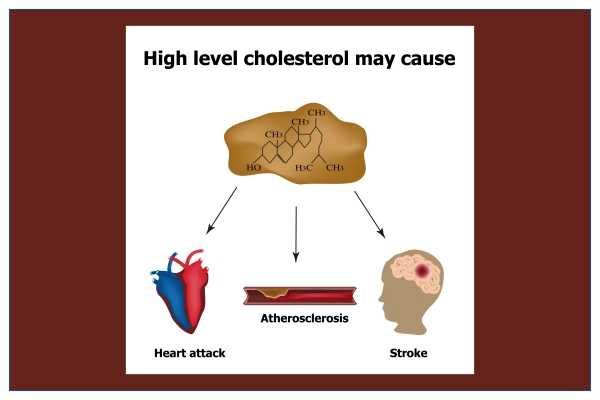
How does high cholesterol affect my body?
Imagine your blood vessels as the pipes in your home that carry water everywhere. When you have high cholesterol, it’s like having gunk building up inside those pipes. This gunk is called plaque, and it sticks to the walls of your blood vessels, making it harder for blood to flow smoothly.
As time goes on, this plaque keeps growing, just like how a clog in your drain gets worse if you don’t clean it. Eventually, it can narrow or block your blood vessels, kind of like how a really clogged drain might stop water from flowing properly.
Because your blood vessels carry blood all around your body, this can cause problems in lots of different places. It’s like if one pipe in your house gets clogged, it can affect other pipes connected to it.
This can increase your chances of having other health issues depending on which blood vessels are clogged.
So, having high cholesterol can lead to problems like atherosclerosis, which is when plaque builds up in your blood vessels. This can make it harder for your blood to flow smoothly and increase your risk of other health problems.
Coronary Artery Disease: Understanding the Culprit Behind Heart Attacks
Coronary artery disease (CAD), also known as coronary heart disease (CHD), is the most common type of heart disease and a major cause of death. It’s like the archvillain in the story of heart health.
Here’s how it works: Your heart is a tireless pump, constantly working to send blood throughout your body. To function properly, it needs a steady supply of oxygen-rich blood. CAD weakens this vital supply chain.
The Culprit: Plaque Buildup: Imagine the arteries leading to your heart like highways. Over time, high cholesterol and other factors can lead to a buildup of plaque (like greasy gunk) inside these highways. This plaque narrows the arteries, making it harder for blood to reach your heart muscle.
Silent Threat: The scary part? CAD often progresses silently for years without any symptoms. You might feel perfectly fine even though the plaque is building up. That’s why getting your cholesterol checked regularly is crucial for early detection.
The Potential Consequences: If left untreated, significant plaque buildup can lead to serious problems like chest pain (angina) or even a heart attack. This happens when the blood flow to your heart is severely blocked.
Remember: Even though you might be young, CAD can affect people of all ages. Taking steps to manage your cholesterol and maintaining a healthy lifestyle can significantly reduce your risk of developing CAD and protect your heart health.
Beyond the Heart: How High Cholesterol Affects Other Parts of Your Body
We’ve talked about how high cholesterol can affect your heart, but it can also wreak havoc on other important parts of your body. Here’s how:
Stroke Danger: Imagine your brain as the control center for your body. It needs a constant flow of oxygen-rich blood to function properly. When high cholesterol leads to plaque buildup in your carotid arteries (the highways delivering blood to your brain), it can cause a stroke.
This happens when a blocked artery cuts off blood flow to a part of your brain, like a mini-power outage. A stroke can lead to temporary or permanent brain damage, affecting things like movement, speech, and memory.
Leg Pain and Beyond: High cholesterol can also affect your legs and arms through a condition called peripheral artery disease (PAD). Think of your legs like busy streets that need good traffic flow to function. When plaque builds up in the arteries of your legs, it narrows the “roads,” reducing blood flow.
This can lead to a symptom called intermittent claudication, which is basically a leg cramp that acts up when you walk or exercise and then eases off when you rest. While PAD primarily affects your legs and feet, remember that all your blood vessels are connected. Plaque buildup in one area can slow down blood flow throughout your entire body.
The Connection: PAD and coronary artery disease (CAD, the one affecting your heart) are often linked. Having one increases your risk of developing the other. They share many of the same risk factors, like high cholesterol, smoking, and diabetes.
By managing your cholesterol and maintaining a healthy lifestyle, you can reduce your risk of not just heart disease but also these other complications caused by plaque buildup. Remember, taking care of your heart health means taking care of your whole body!
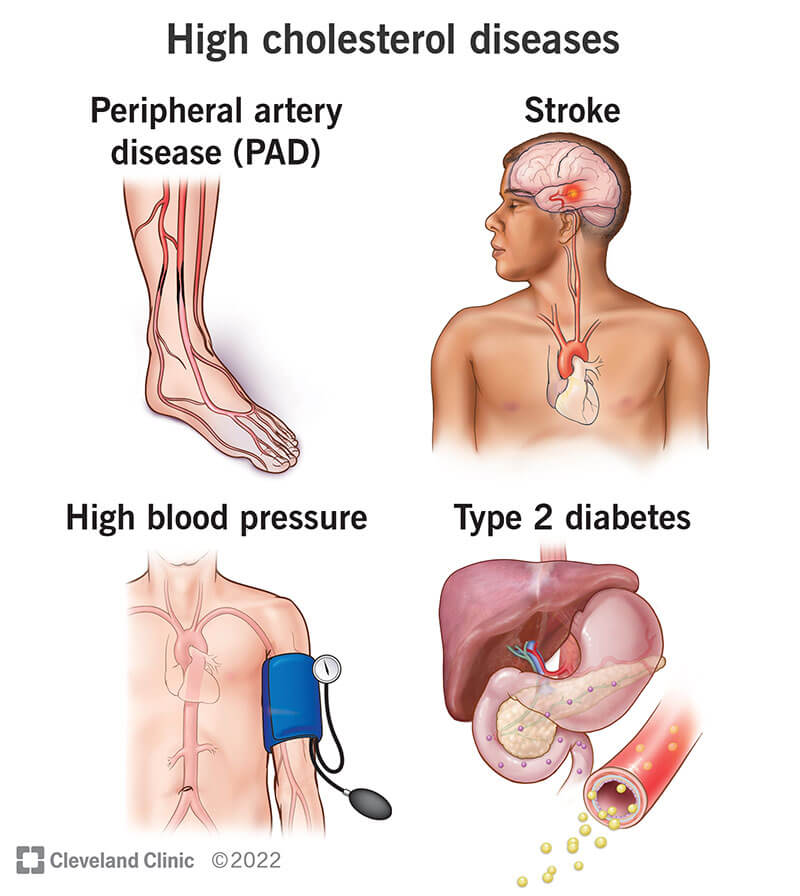
High Blood Pressure: The Silent Partner in Crime
High cholesterol isn’t the only troublemaker when it comes to heart health. Its partner in crime is high blood pressure, also known as hypertension. Here’s how they work together:
Double Whammy: Imagine your arteries as water pipes. Cholesterol plaque and calcium buildup act like gunk, narrowing these pipes. This makes it harder for your heart to pump blood through them.
To overcome this resistance, your heart has to work extra hard, which in turn increases your blood pressure. It’s like having to push harder on a clogged hose to get the water flowing.
A Common Problem: Unfortunately, both high cholesterol and high blood pressure are quite common. In the US, millions of adults have one or even both of these conditions. The scary part? Often, these conditions go unnoticed because they don’t cause any immediate symptoms. That’s why regular checkups are crucial for early detection.
Fighting Back: The good news is there are ways to fight back against this high blood pressure-high cholesterol duo! Medications prescribed by your doctor can be very helpful.
But medication isn’t the only weapon in your arsenal. Lifestyle changes can make a big difference too, and they work even better when combined with medication.
Healthy Habits for a Healthy Heart: Here are some lifestyle changes you can make to improve both your cholesterol and blood pressure:
- Eat Smart: Limit unhealthy fats like saturated and trans fats, often found in fast food and processed snacks. Choose healthier options like lean protein, fruits, vegetables, and whole grains.
- Say No to Salt: Sodium (salt) can raise your blood pressure. Be mindful of hidden sodium in processed foods and read food labels carefully.
- Kick the Butt: Smoking is a major risk factor for heart disease and blood vessel problems. Quitting smoking is one of the best things you can do for your overall health.
By managing both your cholesterol and blood pressure, you can significantly reduce your risk of heart disease and other health problems. Remember, a healthy lifestyle is your best defense!
High Cholesterol’s Unlikely Allies: Health Conditions that Up the Risk
High cholesterol loves company, and unfortunately, some health conditions can make it worse. Here’s how some common issues can increase your risk (causes of high cholesterol):
Chronic Kidney Disease (CKD): People with CKD have a double whammy. This condition not only speeds up plaque buildup in arteries but also affects the different types of fats in your blood. CKD raises bad fats (triglycerides and VLDL) and lowers good cholesterol (HDL).
What’s worse, it even weakens the good cholesterol’s ability to clean things up! The result? A higher risk of heart disease for people with CKD.
SEE ALSO: Remedies for Rheumatoid Arthritis
HIV: People with HIV are more prone to heart attacks and strokes, and while researchers once thought HIV medications were to blame, it turns out the culprit is the immune system itself. When HIV is present, your immune system stays constantly activated, putting your body in a state of chronic inflammation.
This inflammation, in turn, accelerates plaque buildup, increasing your risk of heart problems. The good news is that with advancements in treatment, people with HIV are living longer. But it also highlights the need for more research on how chronic diseases like heart disease affect them.
Thyroid Disease: The thyroid gland plays a role in how your body processes fats (lipids), so it’s no surprise that thyroid problems can affect cholesterol levels. The type of thyroid issue you have determines the impact:
- Hyperthyroidism: This condition makes too much thyroid hormone, and some medications used to treat it can raise all your cholesterol levels (total, LDL, and even HDL). If you have hyperthyroidism and are on medication, talk to your doctor about managing your cholesterol too.
- Hypothyroidism: Here, your body makes too little thyroid hormone, also leading to higher cholesterol. Treatment for hypothyroidism can help lower your cholesterol, but you might still need additional medication like statins to reach your ideal levels. Doctors will consider your individual case to determine the best approach.
While cholesterol is a key player, research suggests that thyroid disease might also affect your heart in other ways. For example, both hyperthyroidism and hypothyroidism might increase your risk of heart failure, independent of cholesterol or plaque buildup.
Lupus: People with lupus often have an imbalance of cholesterol, with higher levels of bad fats (LDL, VLDL, and triglycerides) and lower levels of good cholesterol (HDL). Active lupus is especially concerning, as it raises your risk of high cholesterol even further.
Just like with CKD, lupus creates chronic inflammation in the body, which speeds up plaque buildup in your arteries and increases your risk of coronary artery disease.
Remember, early detection and management of these underlying health conditions can significantly reduce your risk of developing high cholesterol, the causes of high cholesterol and its related complications. Talk to your doctor if you have any concerns!
High Cholesterol’s Risky Partners: Health Conditions That Raise the Alarm
High cholesterol doesn’t operate alone. Certain health conditions can create a perfect storm, increasing your risk of heart problems. Here are a few examples:
Polycystic Ovary Syndrome (PCOS): Women with PCOS are more likely to develop heart disease, especially as they age. This condition raises the red flags for many heart disease risk factors, like high blood pressure and diabetes. PCOS can also disrupt your cholesterol balance, leading to higher levels of bad fats (LDL) and lower levels of good cholesterol (HDL).
Diabetes: Both type 1 and type 2 diabetes can double your risk of coronary artery disease and peripheral artery disease. Diabetes often disrupts your cholesterol profile, lowering good HDL and raising bad LDL and triglycerides. In fact, many people with type 2 diabetes develop a specific type of cholesterol problem called “diabetes-related dyslipidemia.”
This means they have high triglycerides, a specific type of bad cholesterol particle (small dense LDL) that can easily damage artery walls, and low good HDL. Researchers are still exploring the exact connection between diabetes and heart disease.
Don’t Panic, Take Charge: If you have any of these conditions, the good news is you can take control! Talk to your doctor about the best way to lower your cholesterol.
For some people, simple lifestyle changes like reducing saturated fat intake might be enough. Others might need a combination of lifestyle changes and medication.
The key is to discuss your medical history, family history, and lifestyle with your doctor to create a personalized plan to manage your cholesterol and avoid the causes of high cholesterol.
It’s a Journey, Not a Race: Remember, lowering cholesterol takes time and effort. There will be setbacks along the way, and that’s okay! Be honest with your doctor if a plan isn’t working for you.
Sometimes, even the healthiest lifestyle changes might not be enough because your body naturally produces cholesterol. This means other factors beyond your control can also play a role.
The important thing is to take things one step at a time. High cholesterol isn’t a personal failing; it’s a result of various internal processes. Focus on what you can control through diet and exercise, and know that medications and other treatments are there to help fill in the gaps and protect your heart health.
Conclusion
Understanding the Causes of High Cholesterol
High cholesterol can be a real trickster. It lurks undetected in your blood, often causing no symptoms for years. The only way to catch this sneaky thief is through a simple blood test. And here’s the surprising part: even young, active, and healthy people can have high cholesterol.
More Than Just Age: While age can be a risk factor, high cholesterol can affect anyone. There are also certain medical conditions that raise your risk of both high cholesterol and heart disease.
Knowledge is Power: Knowing your cholesterol numbers is crucial. Talk to your doctor about what your results mean for you and what steps you can take to manage your cholesterol levels.
Causes of High Cholesterol:
There are two main culprits behind the causes of high cholesterol:
- Lifestyle: Certain lifestyle choices can significantly impact your cholesterol levels. These include:
- Diet: Eating a diet high in saturated and trans fats can increase bad cholesterol (LDL) and lower good cholesterol (HDL).
- Smoking: Smoking is a double whammy, lowering good cholesterol and raising bad cholesterol.
- Inactivity: A lack of physical activity can also contribute to high cholesterol.
- Stress: Chronic stress can trigger hormonal changes that lead to higher cholesterol production.
- Genetics: Your genes can also play a role in your cholesterol levels. If you have a family history of high cholesterol, you might be at a higher risk.
Remember: Even though some of these factors are beyond your control, there’s still a lot you can do to manage your cholesterol and protect your heart health. Talk to your doctor about creating a personalized plan that includes lifestyle changes and, if necessary, medication. By taking charge, you can keep this silent culprit from causing problems down the road.

A graduate of Computer Science and Information Management Technology. Diploma – Caregiving, Certificates – Dementia and Diabetes Awareness and Management. A researcher, blogger, songwriter, singer and acoustic guitarist. Born in an environment where natural talents such as healing are imparted at our natural birth. This natural talents of healing is the result of our genetic inheritance and the training from family environment.

